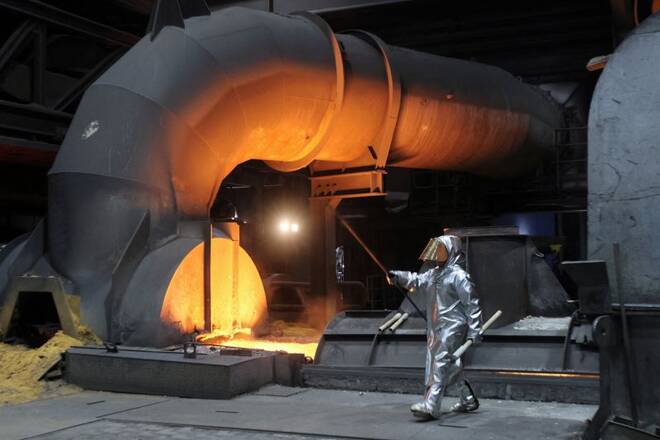Advertisement
Advertisement
EU seeks to arrest industry decline in green transition
By:
By Philip Blenkinsop BRUSSELS (Reuters) - The European Union is a global frontrunner in cutting carbon emissions but is also moving to ensure the green transition doesn't make it an industrial desert, with a raft of measures due to be announced next week.
By Philip Blenkinsop
BRUSSELS (Reuters) – The European Union is a global frontrunner in cutting carbon emissions but is also moving to ensure the green transition doesn’t make it an industrial desert, with a raft of measures due to be announced next week.
Europe’s industrial competitiveness in relation to the United States and China, the world’s two biggest economies, has become a major concern across the bloc 30 years after it created its borderless single market, which some say is now due for a major revamp.
Next week’s announcements include legislative proposals to facilitate domestic production of key supplies and streamline grants for green projects, and also address the divisive issue of state aid. They come before a summit of EU leaders on March 23-24 to discuss and guide the EU response.
Many in the EU are worried that U.S. President Joe Biden’s Inflation Reduction Act, which offers $369 billion of green subsidies that often only apply to products made in North America, could lure companies out of Europe, allowing the United States to grow into a clean tech giant at Europe’s expense.
EU internal markets commissioner Thierry Breton said this week it was clear that both the United States and China were seeking to attract industrial capacity away from Europe and so make Europe dependent on their industries in future: “Or to put it more bluntly – they are engaged in a subsidies race. Not us; them.”
The EU likes to see itself as a champion on tackling climate change with its goal of carbon neutrality by 2050 and tough 2030 emissions targets, with progress on that front ahead of efforts in the United States and China.
But while it holds strong positions in certain green sectors, it risks being outpaced in technology.
Patents lag
On patents in key future digital and green technologies, Europe lags the United States across the board, according to a report by McKinsey Global Institute which showed that both were behind China and other east Asian countries in clean tech.
The supply of minerals vital for the green transition is a further challenge, with China processing almost 90% of rare earths and 60% of lithium, a key element for batteries.
Russia’s invasion of Ukraine has reinforced a lesson learned during the early months of the COVID-19 pandemic, namely that the EU cannot rely on a single supplier for essential materials, whether personal protective equipment or oil and gas.
The pandemic already led to calls for EU “strategic autonomy” – though opened up a debate as to whether that meant producing essential goods in the bloc or diversifying supplies.
On the former, the EU executive will propose legislation on Tuesday enabling the region to mine 10% of the strategic raw materials it consumes and increase processing to 40% of its needs by 2030.
On the latter, the Commission believes trade deals with the likes of Chile and Australia, the two largest producers of lithium, could ensure direct supply and reduce reliance on China.
It will also make proposals to streamline the granting of permits for green projects, which at present can take many years, and foster investment in net-zero industry “valleys”.
Then there is the thorny question of subsidies and a possible future European Sovereignty Fund, an idea first raised by European Commission President Ursula von der Leyen last year.
Both topics are divisive. Backed by France and Germany, the Commission has proposed easing state aid rules to allow green investment, which could extend to matching subsidies offered elsewhere for net-zero technologies.
Some EU countries complain they will not be able to match the sums offered by the EU’s two largest economies.
Breton argues the sovereignty fund would help ensure a level playing field between EU countries that do not have the same ability to provide state aid, with financing through joint borrowing.
But northern EU members led by Germany have already warned against new common debt, highlighting there are still unused funds from the bloc’s 800 billion euro ($847.60 billion) pandemic recovery fund.
Countries such as the Netherlands, the Nordics, the Czech Republic and Ireland have also warned of the risk of excessive, blanket subsidies and say work to improve the EU single market would be more effective.
Often called the crown jewel of European integration, the EU single market launched in 1993 has been a game-changer for the free movement of goods but has done less to stimulate other parts of the economy.
“If you look at what we have today in terms of the single market for goods it’s highly effective, it makes the EU very competitive globally and we need to try to do the same for services and digital in particular,” Irish Trade Minister Simon Coveney said at a meeting with EU counterparts on Friday.
($1 = 0.9438 euros)
(Reporting by Philip Blenkinsop; Additional reporting by Jan Strupczewski; Editing by Mark John and Susan Fenton)
About the Author
Reuterscontributor
Reuters, the news and media division of Thomson Reuters, is the world’s largest international multimedia news provider reaching more than one billion people every day. Reuters provides trusted business, financial, national, and international news to professionals via Thomson Reuters desktops, the world's media organizations, and directly to consumers at Reuters.com and via Reuters TV. Learn more about Thomson Reuters products:
Advertisement
